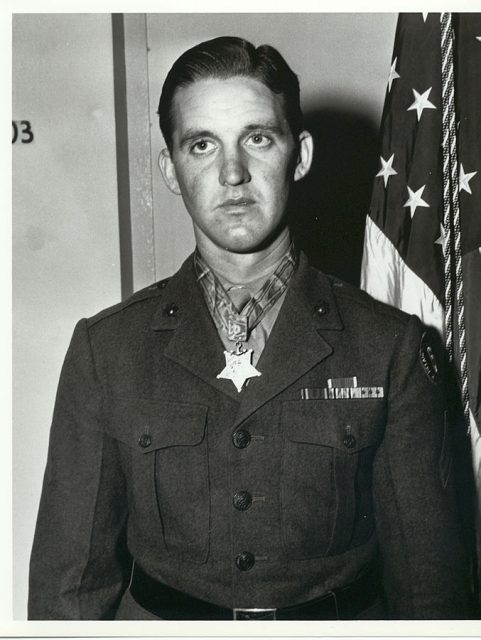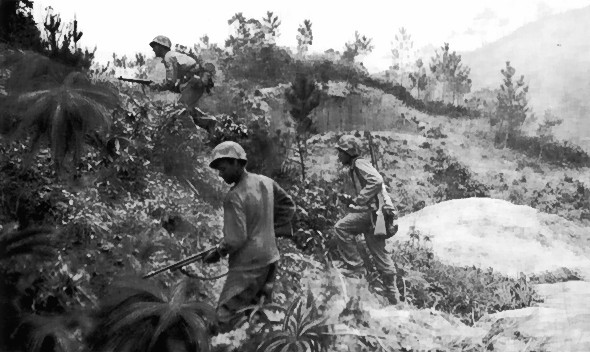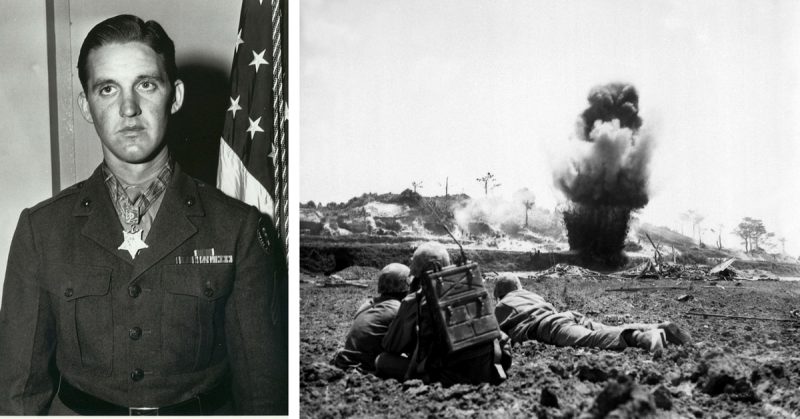For many Marines, the cries for “Doc” on the battlefield signal the end of their time in combat. If the doc can patch them up and send them back into the battle, he will. But in most cases, it is time to extract the Marine from the battlefield and send them to the rear with the gear.
Such was seemingly the case for Marine Corporal Richard Bush during the Battle of Okinawa. Leading his Marines through the rocky ridges of Mount Yaedake, Bush braved a heavy barrage of artillery fire and a relentless enemy determined to pay for every square inch of their homeland with blood. Leading from the front, his unit was the first to break through the enemy’s inner defenses, resulting in severe wounds to Bush.
Having been evacuated and under medical care, Bush was resting with others under cover of protecting rocks when an enemy grenade fell among the Marines and Corpsmen. Despite his injured and weary state, Corporal Bush pulled the grenade to his body ready to make one last sacrifice for his Marines and country. The grenade exploded causing devastating injuries to Bush. With those around him safe, Bush had earned himself the Medal of Honor for this action. Most importantly he somehow survived his gallant deed and lived a long and fruitful life.
From the Farm to the Pacific
Richard E. Bush was born just before Christmas in 1924 Glasgow, Kentucky. Like many men of the area and time, agricultural needs took precedent over his education. Working with his father on a tobacco farm as a tractor driver, Bush had only completed one year of high school by the time his nation came calling. In September 1942, Bush enlisted in the US Marine Corps Reserve and was sent to Camp Elliott, California to await his fate in the Pacific.
Bush later joined the famed Marine Corps Raider unit. The Raiders were initially intended to be deployed for special warfare operations but were primarily used as regular infantry during the many island assaults needed in the Pacific Theatre. By April 1945, Bush was serving as a squad leader with 1st Battalion, 4th Marines, 6th Marine Division. For Bush, it meant a rendezvous with military history during the brutal assault on Okinawa.
The Battle of Okinawa pitted hundreds of thousands of American troops against over 100,000 Japanese soldiers and conscripts. Just 340 miles from the Japanese mainland it was considered hallowed Japanese territory. Its defenders understood the importance of the battle and were determined to make the Allies pay a hefty price. It took 82 days of hard fighting to secure the island and resulted in the horror of thousands of Japanese civilians committing suicide to avoid being captured by the allies.

The Battle for Mount Yaedake
On April 1, 1945, hundreds of thousands of American troops hit the beaches of Okinawa and began to push inland. The fighting was as dense and fierce as the Americans had expected on land, air, and sea. Offshore, American ships were subjected to hundreds of sorties from Japanese kamikaze aircraft. With devastating effect, the Japanese had turned their once-prized aircraft into missiles of destruction and death. Inland, the Marines were finding the rocky terrain of Okinawa a tough fight.
By April 16, 1945, Bush and the Marines of 1st Battalion, 4th Marines were pushing up against an enemy stronghold centered on Mount Yaedake. Rimmed with sharp rocky ridges, the terrain was a strong, natural defense. The Japanese had trained their guns and artillery on the American approach, and the mountainside lit up with fire from their massive bombardment. Bush could be seen leading his squad from the front.
With confidence and serving as an inspiration to his Marines, Bush led them over the face of the mountain, and they were able to sweep the enemy of the ridge. Despite the Japanese being heavily entrenched, Bush continued to press the assault and was successful at dislodging the determined enemy. His unit was the first to break through the inner defenses of Mount Yaedake and paid a heavy price for their achievement. During the final assault, Bush was severely wounded and required evacuation. Having already displayed gallantry worthy of commendation, he was withdrawn to the cover of a rocky precipice to receive emergency aid.

One Last Act of Gallantry
Despite having been withdrawn from the front, every square inch of Okinawa was still very much a dangerous place to be. As Bush was being treated, a Japanese grenade rolled down the hill and came to rest next to the Marines and Corpsmen. Despite being attended to, Bush was cognizant enough to analyze the situation quickly. Either he would have to act immediately, or the already wounded Marines all around him would be killed. With just seconds to decide, Bush corralled the grenade and drew it to his body while bracing himself for the worst.
The grenade exploded, sending hot metal shrapnel through his body. When the Marines and Corpsman looked up to see what had taken place, they knew they had seen one of the bravest acts of the war. Fortunately, due to the skill of the Corpsman and the indomitable spirit of Corporal Bush, he survived. He lost several fingers along with his vision in one eye, but Bush emerged having earned the nation’s highest military honor.
He received his Medal of Honor in October 1945 from President Harry S. Truman. After the war, he continued to serve his fellow veterans by working as a counselor with the Veterans Administration. Despite his willingness to invite death that April day in 1945, Bush lived to the ripe old age of 79 before passing away in 2004. One of the few men to jump on a grenade and live to talk about it, Bush had rightfully earned his place in military history.
